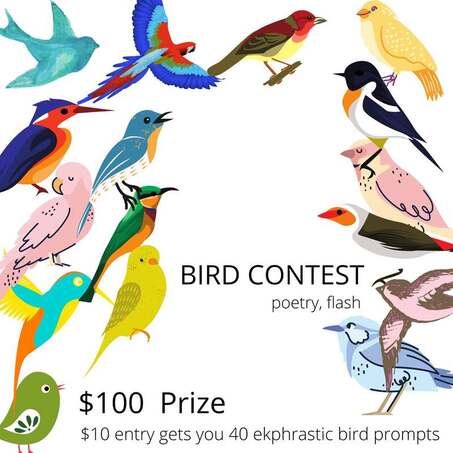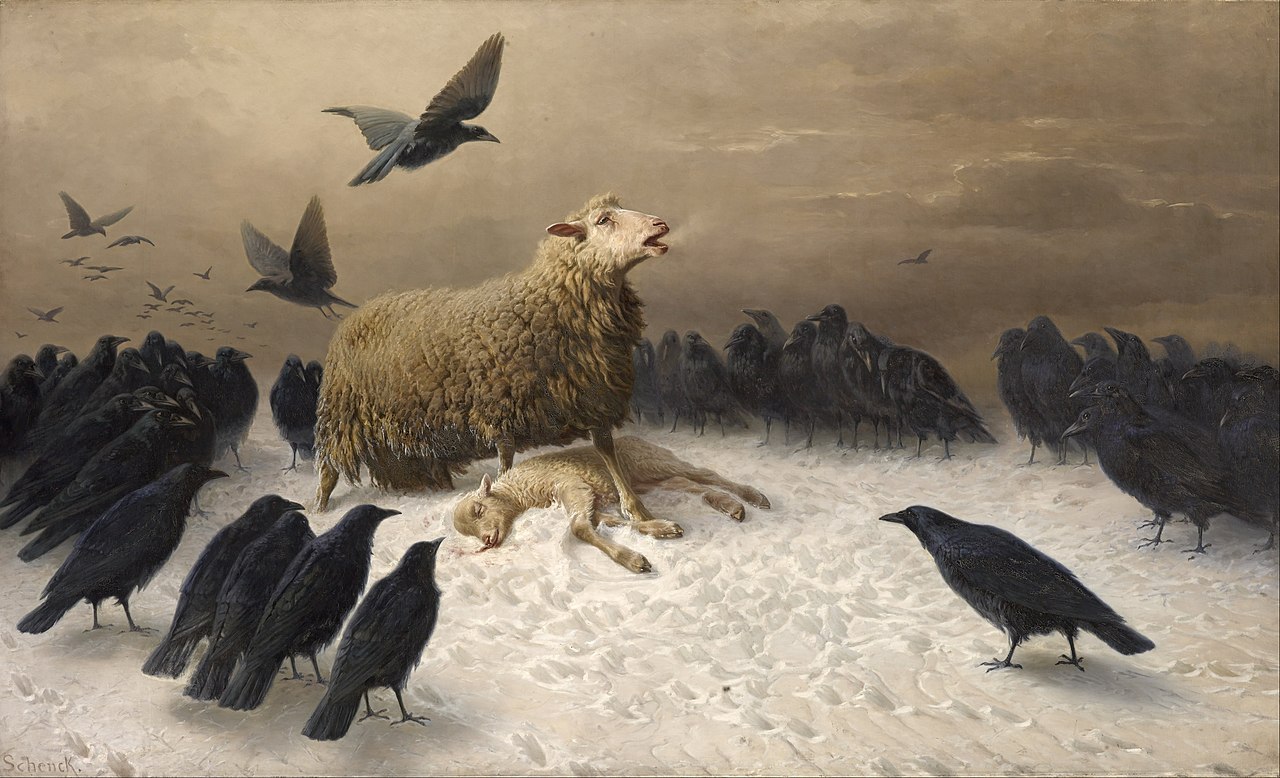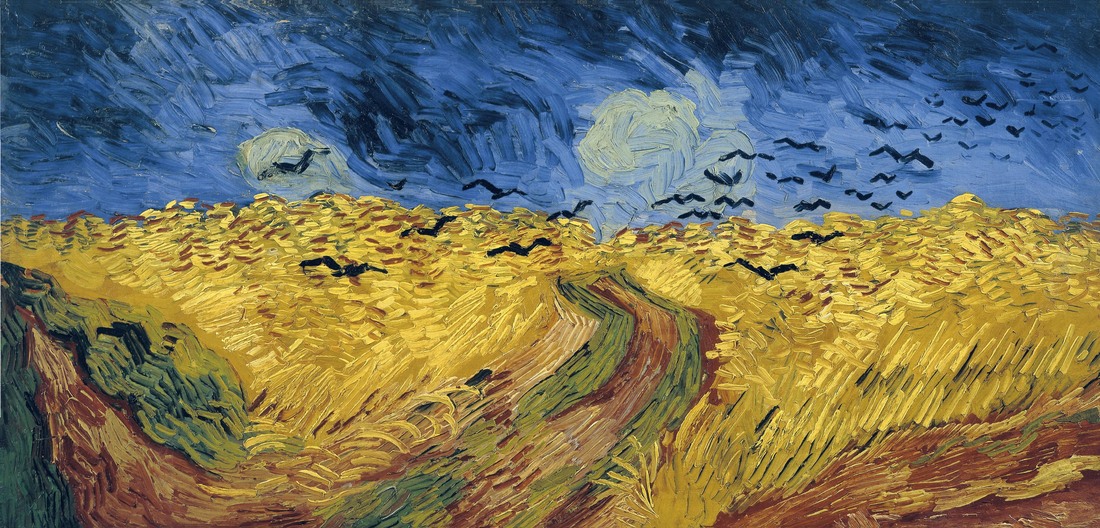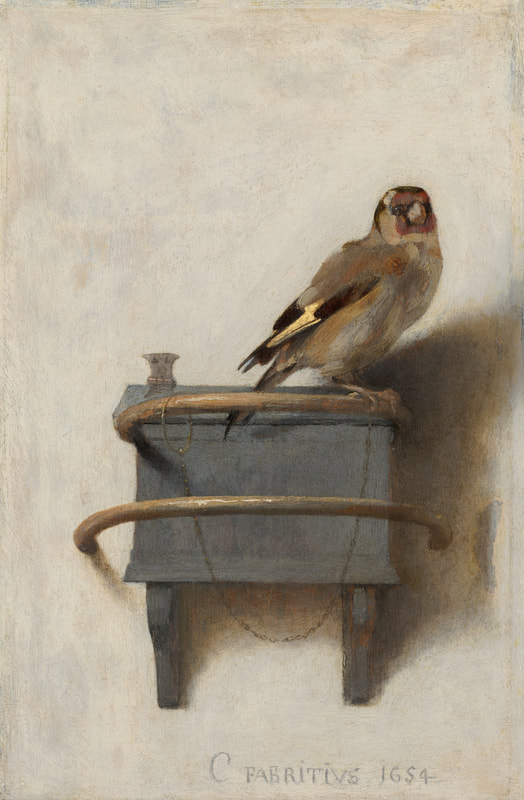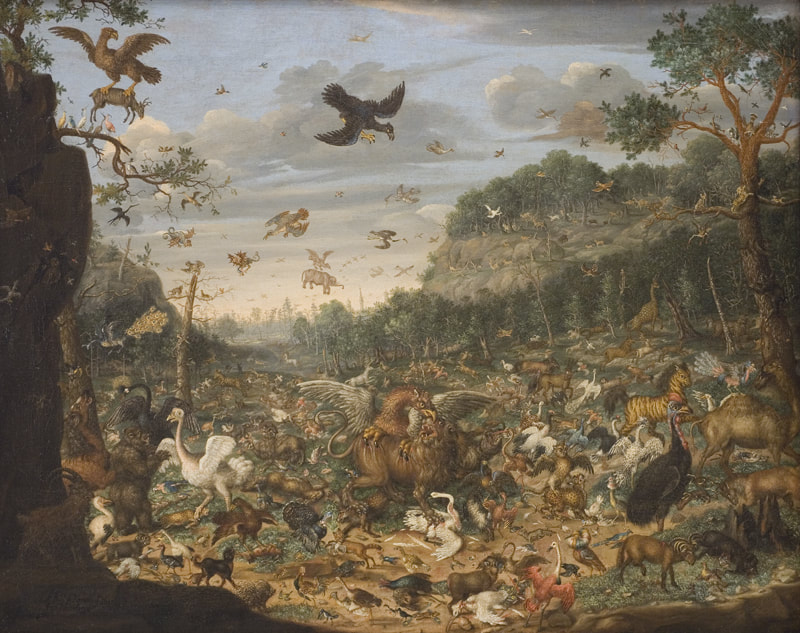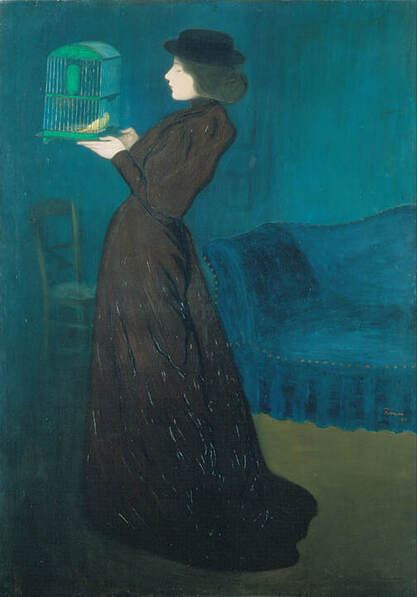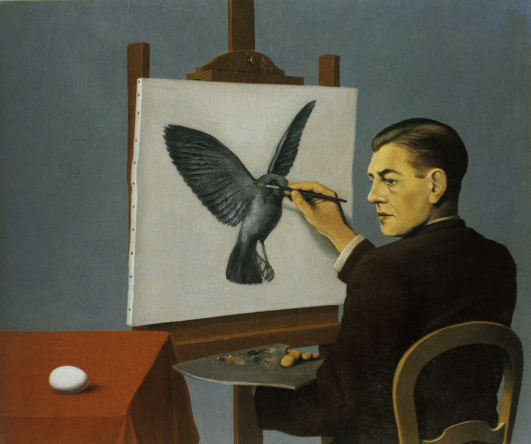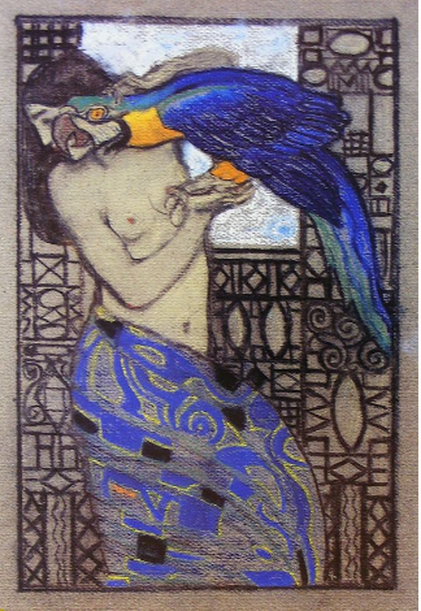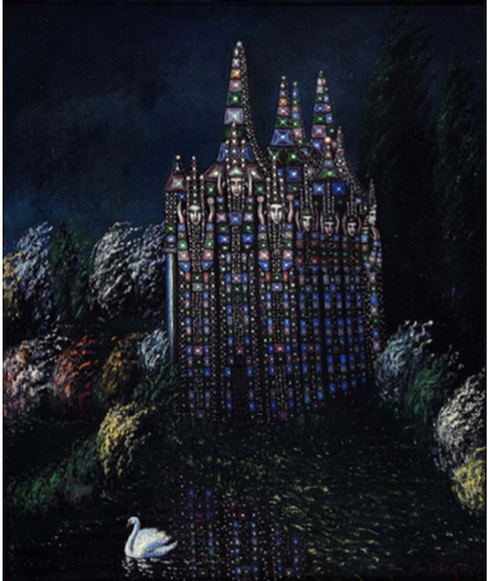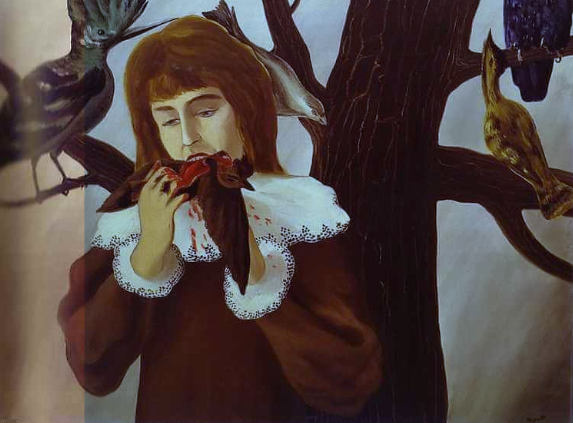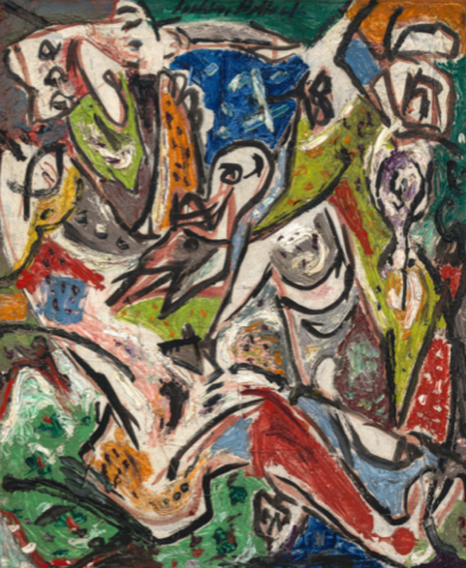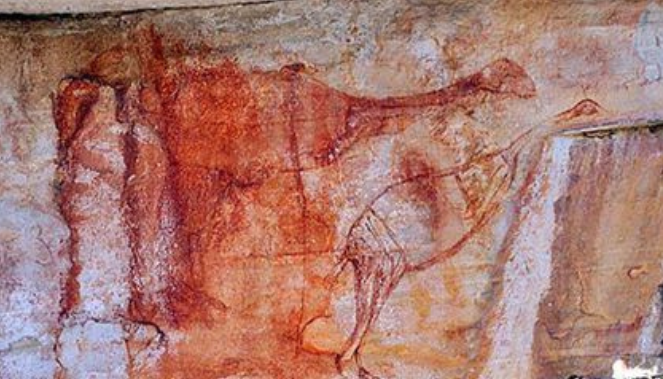|
At long last, the finalists for the Bird Watching contest have been selected! There will be two posts, one for flash fiction, and one for poetry. Be sure to bookmark them both so you don't miss any. The bird theme in art is literally as old as the caves, and transcends cultures, media, and time. We are fascinated by birds: they can fly, for one thing, which makes them seem magical. We see them as richly symbolic: freedom, peace, life, death, mystery, war. We see them as messengers. The Bird Watching ebook contained forty intriguing artworks on the theme of "birds." Participants entered up to five poems or stories inspired by those works. (If you missed the contest, you can still use the curation of bird paintings and other art in your ekphrastic practice. Click here to nab yours.) Congratulations to our finalists in flash fiction and in poetry. It was incredibly difficult to choose. The Ekphrastic Review seems to attract and inspire a magnificent array of creativity. We have attracted a wealth of poetry from the start of the Review. This was no exception. Narrowing down the pool of tremendous poetry was painful for me! I am very grateful that I can pass off the tough job of choosing one from these finalists to Tricia Marcella Cimera. Tricia is our guest judge for poetry, and her choice will be awarded $100CAD and publication in The Fox Poetry Box, her brainchild installation of poetry in St. Charles, Illinois. Tricia is a widely published poet, a longtime contributor, and her poem, "Second Plum" was nominated by TER for a Best of the Net award. Her recent chapbook is GO SLOW, LEONARD COHEN. We can't thank you enough, Tricia, for sharing your talent and expertise with us as our poetry judge. (Find the flash fiction finalists here.) Poetry Finalists Fate Foreseen, by Portly Bard Savage, by Laurel Benjamin The Woman and the Canary, by Jamie Brian Bird, Temple, Mirror, by Dorothy Burrows The Myth of Keeping Busy after Loss, by Sandra Fees Woman with a Bird Cage, by D. Walsh Gilbert Genyornis Newtoni, by Ronnie Hess The Eye Always Describes Itself, by Mary B. Moore Wheat Field with Crows, by Pamela Porter The Goldfinch Tale, by Alun Robert Bright Feathers in Moonlight, by Janet Ruth Young Girl Eating a Bird, by Matthew Sisson Recurring Nightmare, by Alarie Tennille February’s Loss, by Rebecca Weigold Congratulations to all of you!!! We are grateful to each and every participant. Your ebook purchases have helped us create these cash prize contests where we can pay a winner. We have also been able to run a few social media ads, with the goal of attracting more readers. And as the Review grows and takes more and more time, your purchase and support helps accommodate that reality. Soon we will turn six and we are just getting started! We want to have many more challenges, contests, and content and we are so glad you are part of this wonderful movement. Join us for our next contest, on the theme of Women Artists. Our guest judge is Alarie Tennille! Without further adieu, here are the poetry finalists. love, Lorette February’s Loss remembering Judah Your heart stopped and February collapsed under the strain of the news. A chill caw pierced my bones: There must have been something wrong…as though I had botched spinning a wool blanket. You were not a mistake. Not a mishap. Not a malfunction. Your body was the size of a down feather, finespun breath and skin… is loss any smaller when it is something small? Lullabies flapped and circled, alighted at my feet. I crowed your name as though my wails could bring you back, as though in frantically turning under the bitter ground I could find explanation, comfort, but the field only shuddered and gave up its dead while God watched in silence perched in the skeleton of ash. Rebecca Weigold Rebecca Weigold studied writing and theatre at Northern Kentucky University. Her poetry has appeared in BlazeVox, The Ekphrastic Review, Tipton Poetry Journal, The Tishman Review, and other publications. She has been an editor, a model, and an actor. Rebecca loves to travel to see her favorite band, Duran Duran, and has been to several countries. She lives in Kentucky with her computer programmer husband, has two adult sons, and an adorable muted calico named Sox. ** Recurring Nightmare I’m only six years old the first time and wake with a bleat. Such an odd dream! A field of sheep and crows, no humans except me. I know I’m my real self because I want to pet the sleeping lamb. Don’t understand it’s dead. Only three crows then, but being alone in a field scares me almost as much as those dagger beaks and piercing stares. Perhaps I’m witnessing the lamb of God visited by three austere magi or priests come to give last rites. Year by year the trinity of crows grows to an impressive murder. Any sane person would be afraid to stand among them now. The thunder of wings overhead triggers the memory: I’ve been here before, cooling in the snow, the shaking ewe standing over me. Panic continues to wake me before anything happens. Soon I’ll be the fierce ewe standing my ground like mothers do. I worry about the night I become a crow. Alarie Tennille Alarie’s latest poetry book, Waking on the Moon, contains many poems first published by The Ekphrastic Review. Please visit her at alariepoet.com. Wheat Field with Crows Light, and the reverse of light. And the sky dark as a breaking sea, a storm built one upon another. And wheat bending in the wind as though alive, alight as if it were a fire set, in search of the one lost. Such is the wind’s sadness. A kind of church which sanctified colour, the angelic flock of the dark-winged. And throughout, a snake of green, a river, as though it flowed as veins in the souls of the dispossessed. Here he stood in his silent world. He slapped on impasto straight from the tube. Crows tossed in as though they were shards broken off from the night. Each thick stroke as if God himself had proclaimed it. And light, the remaining light an ache inside the brain — this the field he blessed and by which he was blessed, freed from the cement room in which he was kept, from which he wrote his letters to Theo: Through the iron-barred window I see a square field of wheat, and above, the morning sun in all its glory... The heart’s labour. Where this earthly journey begins and where it ends. Your life is no accident. All who come into this world are sent. Pamela Porter Pamela Porter is the author of four collections of poetry, two verse novels, and a novel and picture book for children. Her poetry collection, Cathedral, was shortlisted for the Pat Lowther Award, and her poems have won the Vallum Magazine Poem of the Year Award, the Prism International Grand Prize in Poetry, the FreeFall Poetry Prize, and have been shortlisted four times for the CBC literary awards. Her verse novel,The Crazy Man, won the 2005 Governor General’s Award, the TD Canadian Children’s Literature Award, the Canadian Library Association Book of the Year for Children Award, and other accolades. M. Travis Lane has written, “Porter’s poems are pervaded with a sense of grace, of mercy, beauty and benediction.” Pamela lives in North Saanich with her family and a menagerie of rescued horses, dogs, and cats, including a formerly wild mustang. The Goldfinch Tale fringilla carduelis passerine green captured finch studio Delft perched alone high chained fed watered trilled sung looked listened smelled sensed posed poised static erect Fabritius observed painted lead brushed scratched trompe-l’œil completed unframed thunderclap killed acquired lost found bequeathed auctioned purchased Mauritshuis Hague displayed toured no longer sings Alun Robert Alun Robert is a prolific creator of lyrical free verse. He has achieved success in poetry competitions across the British Isles and North America. His work has been published by many literary magazines, anthologies and webzines in the UK, Ireland, Italy, South Africa, Kenya, USA and Canada. Since 2018, he has been part of The Ekphrastic Review community particularly enjoying the challenges. He is a member of the Federation of Writers Scotland for whom he was a Featured Writer in 2019. Savage Not the Roman Empire but claws lashing on air, elephants flying to ground vulture finally meeting his match cities pounded until eyelids bandaged only a lone towhee, orange rump ringing his approach. They do not like crowds as humans do this is not the Colosseum. Sorrows gild in a garden without humans. No heaven or hell, animals climb an eternal tightrope through atmosphere rungs to a place without hierarchy without angels, and below no demons. A wolf’s treasure not raided even if rampage destroys flowers. We are the trodders humans with our eyes that cling jaws that turn air we who seduce everything yellow the original garden overturned. When the animals take over we then passersby with no Godly notion just briefcase empty of paper just savage. Laurel Benjamin Laurel Benjamin holds an MFA from Mills College. She lives in the San Francisco Bay Area. Her work has appeared in Turning a Train of Thought Upside Down: An Anthology of Women's Poetry, California Quarterly, The Midway Review, Mac Queens Quinterly, Wild Roof Journal Poetry and Places, WordFest Anthology, Global Quarantine Museum Pendemics issue, Silver Burch Press, including honorable mention in the Oregon Poetry Association’s Poetry Contest 2017 and 2020, long-listed in Sunspot Literary Journal’s long list, among others. She is affiliated with the Bay Area Women’s Poetry Salon and the Port Townsend Writers. More of her work can be found at https://thebadgerpress. The Woman and the Canary I know your heart; I have seen it, the canary calls to the woman in black from the window’s ledge. Nothing grows there anymore, not primrose or lily or even the common daisy. You have strangled your love with vines, and you do not know how to let it live. It is the first day of spring. Outside, the world is waking up from its slumber. Streetlights flutter on and children stumble into the village square for jump rope games. In her room, dust swirls in corners that light has not reached in years. She wears the dress of mourning. It has been so long since any voice but her own has spoken, so long since music filled these walls. Won’t you stay just a little longer? the woman asks. I have other suns to bask in; I must be going-- The canary sings, stretching its wings to leave. Before the canary can finish speaking, the bars of the cage encircle its body and bind its wings. The sky lies just beyond the window’s ledge, but suddenly it is as unreachable as a streak streak of sunlight at the end of the world. If you pass under that townhouse window, you can hear the canary calling still, its song growing louder and louder with time, a flightless bird pacing the floor of an iron cage like a heart straining against the end of its leash. Jamie Brian Jamie Brian is a pilot and freelance writer living in Pennsylvania. Her work has appeared in The Poeming Pigeon, Ephemeral Elegies, and Auroras and Blossoms Poetry Journal. ** Woman with a Bird Cage Canary, you, with your throat opening the way the chestnut buds of Goat Willow open into pods of buttermilk, come with me. Your voice bursts wide like the yellow-feathered seed capsules of witch hazel. And I need you. I’m closed within an elderberry’s purple-black, a tincture of its toxic roots. Once clothed in the mint-ruffled bunting of ruby peonies in April, now I’m draped in woolen thorn, hat-brimmed and pinned without a vine or tendril spilling. I wear the winter-knotted bark of galled and wounded maple branches. Show me your face. Teach me your timbrado melody sung though your golden-wired bars. Mallow. Primrose. Clover song. Warble me. Bird me. Sky me through the rainclouds. The ground is loosening, and asparagus shoots have broken through. Let me open the cage’s door. Peregrine the two of us. D. Walsh Gilbert D. Walsh Gilbert is the author of Ransom (Grayson Books, 2017). A Pushcart nominee, she has also received honors from The Farmington River Literary Arts Center and the Artist for Artists Project at the Hartford Art School. Her work has most recently appeared in Montana Mouthful, The Ekphrastic Review, Vita Brevis, Third Wednesday, Uppagus, The Purpled Nail, and the anthology, Waking Up to the Earth: Connecticut Poets in a Time of Global Climate Crisis. She serves on the board of the non-profit, Riverwood Poetry Series, and as co-editor of the Connecticut River Review. Fate Foreseen For want of warmth it could not beg, it's merely now infertile egg -- a source of life, though still within, without its moment to begin -- that faces in what time remains the fear of fate that feast ordains for those who would not know the soul now taken from its brief control if not for eye and hand and brush of mind that sees within its hush the wonder that it might have been bewinged as life begun again to keep its species still alive beyond all it would dare survive. Portly Bard Old man. Ekphrastic fan. Prefers to craft with sole intent of verse becoming complement... ...and by such homage being lent... ideally also compliment. Bright Feathers in Moonlight the old priestess leans on her staff her back bent, her skin wrinkled her eyes cloudy now but her mind as sharp as ever-- as piercing as the claws that grasped her hand the first night the macaw flew into her room on a silver shaft of moonlight the first time he whispered in her ear in the voice of a god she stood naked before his insistence before the glimmer in the velvet words that slid from his golden throat he had murmured of summer places far to the south called her to a lifetime of service to bright feathers opulent ceremonies and stony pyramids she foreswore forever the gentle touch of a man the chubby clutches of children and yet-- standing here alone, a faded cloth woven with blue and silver symbols wrapped around her withered breasts a single tattered ultramarine plume grasped in her gnarled fingers-- if she could go back, she still would not resist that velvet voice Janet Ruth Janet Ruth is a New Mexico ornithologist. Her writing focuses on connections to the natural world and she thoroughly enjoyed putting a bird in every one of her poems for this challenge. She has recent poems in Tiny Seed Literary Journal, Sin Fronteras, Spiral Orb, Unlost: Journal of Found Poetry & Art, and anthologies including Moving Images: Poetry Inspired by Film (Before Your Quiet Eyes Publications, 2021), and New Mexico Remembers 9/11 (Artemesia Publishing, 2020). Her first book, Feathered Dreams: celebrating birds in poems, stories & images (Mercury HeartLink, 2018) was a Finalist for the 2018 NM/AZ Book Awards. With sister-poets Faith Kaltenbach and Andi Penner, she self-published the chapbook What is the Boiling Point of Clouds? (2019). https://redstartsandravens.com/janets-poetry/ Bird, Temple, Mirror mute, silvery swan, ghosting glassy waters, lit by bright bulbs illuminating ice towers piercing deeply inked skies. all around, rainbow trees shimmer rocks mimicking clouds drifting upwards. celestial, enchanted birds; praising, worshipping silvery swan… …swan silvery, worshipping, praising birds; enchanted, celestial. upwards, drifting clouds mimicking rocks shimmer. trees rainbow. all around, skies, inked; deeply piercing ice towers, illuminating bulbs. bright by lit waters, glassy, ghosting swan; silvery, mute. Dorothy Burrows Based in the United Kingdom, Dorothy Burrows enjoys writing poetry, flash fiction and short plays. She regularly walks over the downland near her home and can often be spotted watching kettles of red kites whistling. This year, her poems have appeared in The Ekphrastic Review, Spelt Magazine, The Alchemy Spoon, Wales Haiku Journal, Failed Haiku, The Poetry Pea and Prune Juice. She tweets @rambling_dot Young Girl Eating A Bird Birds descended from dinosaurs, one continuous phylogeny, Archaeopteryx to the American Bald Eagle. That ancient predestinator never inhabiting the Garden of Eden. I was a bird watcher, but couldn’t help thinking Thanksgiving, and four and twenty blackbirds. “You’ve got to move quickly if you want to follow sap-suckers,” our guide scolds. I’m moving as fast as I can. And the birds: Cedar Waxwings, Bombycilla cedrorum all dominance hierarchy in post-modern pastels. Scarlet Tanagers, Piranga olivacea, garish in conflict management. Black-caped Chickadees, sleeping owls. Work, alcohol, and family. Evolutionary pressure. All of us struggling to survive. Matthew Sisson Matthew Sisson’s poetry has appeared in magazines and journals ranging from the Harvard Review Online, to JAMA The Journal of the American Medical Association. He has been nominated for a Pushcart Prize, and read his work on NPR’s On Point with Tom Ashbrook. His First book, Please, Call Me Moby, was published by the Pecan Grove Press, St. Mary’s University, San Antonio, Texas. The Myth of Keeping Busy after Loss A bird is a nibbed instrument the sweep of the calligrapher’s pen a bird, coiffed elegance or buffed refusal each effort a wing-boned strength and muscular métier an insistence that life is motion-- the only thing you can’t do is stop the only thing you can’t do is be perfectly still-- or you’ll plummet, crumble to ash. Such. An. Exquisite. Lie. A bird is a brushstroke of blue or red or grief gathered to your stilling beat poured out in splattered song. Sandra Fees Sandra Fees is the author of The Temporary Vase of Hands (Finishing Line Press, 2017), served a term as Berks County, Pennsylvania, Poet Laureate (2016-2018), and is a 2020 Pushcart Prize nominee. Her work has appeared in The Comstock Review, Chiron Review, Sky Island Journal, and The Ekphrastic Review, among others. She holds a master’s degree from Syracuse University's Creative Writing Program and Master of Divinity and Doctor of Ministry degrees from Lancaster Theological Seminary. She resides in South Central Pennsylvania and enjoys long walks near water and Sivananda yoga. ** The Eye Always Describes Itself Are those birds or entrails? They coil and veer into or grow inside each other: sinuous necks, beaked and billed heads, the round press of bodies. The thick black outlines don’t forestall the slippage: they insist. A duck head near the coil’s centre smiles, its eye Groucho Marx’s, the brow, a check mark, and below its bill, another bill opens, a black line between the halves: a serpent’s tongue under the humor. An ivory-crested waterbird’s neck greens into a another sinuous neck below, its beak points down. Nearby, a gray shape, almost a small hawk’s, points for eyes, lodges in a larger bird. Everything mothers another or has eaten it. The palette is brilliant, jays’ and bunting’s blues, vireo greens, rooster reds, a milkier jade green and the eider-neck teal above and winding around. My writer friend Rachael doesn’t like birds. I never asked why. Pollock’s attitude is obscure: The small jade duck near the bottom may float under an upside down seagull, neck and eye red, bill slightly open. Is he dead or merely red? An orange wing nests among the mélange, the edges scalloped. I see a curled swan’s neck too. Step back, and behold! The whole coil is a bird head or mask: two eyes, the main beak, and the gull caught in it: The palette, kill, eat, and preen, head a swarm of guts, beak a mechanism for tearing and singing: it’s nothing like me, nothing at all. Mary B. Moore Mary B. Moore’s books include three full-length collections and several chapbooks: Dear If, is due out from Orison Books, late 2021; Amanda and the Man Soul (Emrys Chapbook Prize, 2017), Flicker (Dogfish Head Book Prize, 2016), Eating the Light (Sable Books Chapbook Contest 2016), and The Book Of Snow (Cleveland State University, 1997). She has also received several awards for poems in Terrain, Nelle, Nimrod, and Asheville Poetry Review. Recent work appears in Poetry, The Gettysburg Review, Prairie Schooner, 32 Poems, The Georgia Review, The Birmingham Poetry Review, The Nasty Women Poets Anthology, Fire & Rain-Ecopoetry of California, and others. Genyornis Newtoni O, biggest of big birds, three times the size of an emu, 500 pounds of muscle, bone: Early hunters may have tracked you too hard across the Australian landscape, poached your eggs buried in sand. Or, was it the earth went dry, a kind of early warming? You were the Pleistocene’s passenger pigeon, dead as a dodo, giant Moa, great Auk, Carolina parakeet, elephant bird. Like police detectives contemplating the body, we ask, What happened? Or, Who did this to you? Not what medium was used: Charcoal, clay, shell, amalgam of powders, not whether the painter was extinction’s blind culprit. Isn’t the story beyond the telling? To observe is to be responsible. Giant ibis, New Caledonian owlet-nightjar, birds in our backyards. Ronnie Hess Ronnie Hess is an essayist and poet, the author of five poetry chapbooks (including O Is for Owl) and two culinary travel guides on France and Portugal (Ginkgo Press). She birdwatches from a perch in Madison, WI.
0 Comments
Your comment will be posted after it is approved.
Leave a Reply. |
The Ekphrastic Review
COOKIES/PRIVACY
This site uses cookies to deliver your best navigation experience this time and next. Continuing here means you consent to cookies. Thank you. Join us on Facebook:
Tickled Pink Contest
April 2024
|
